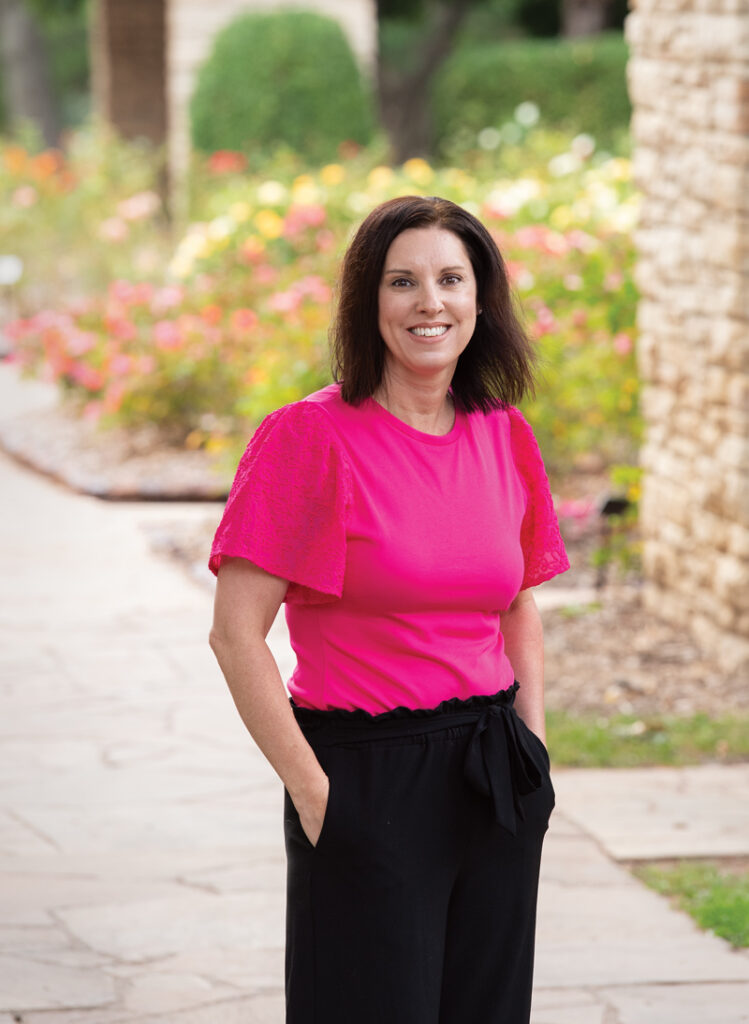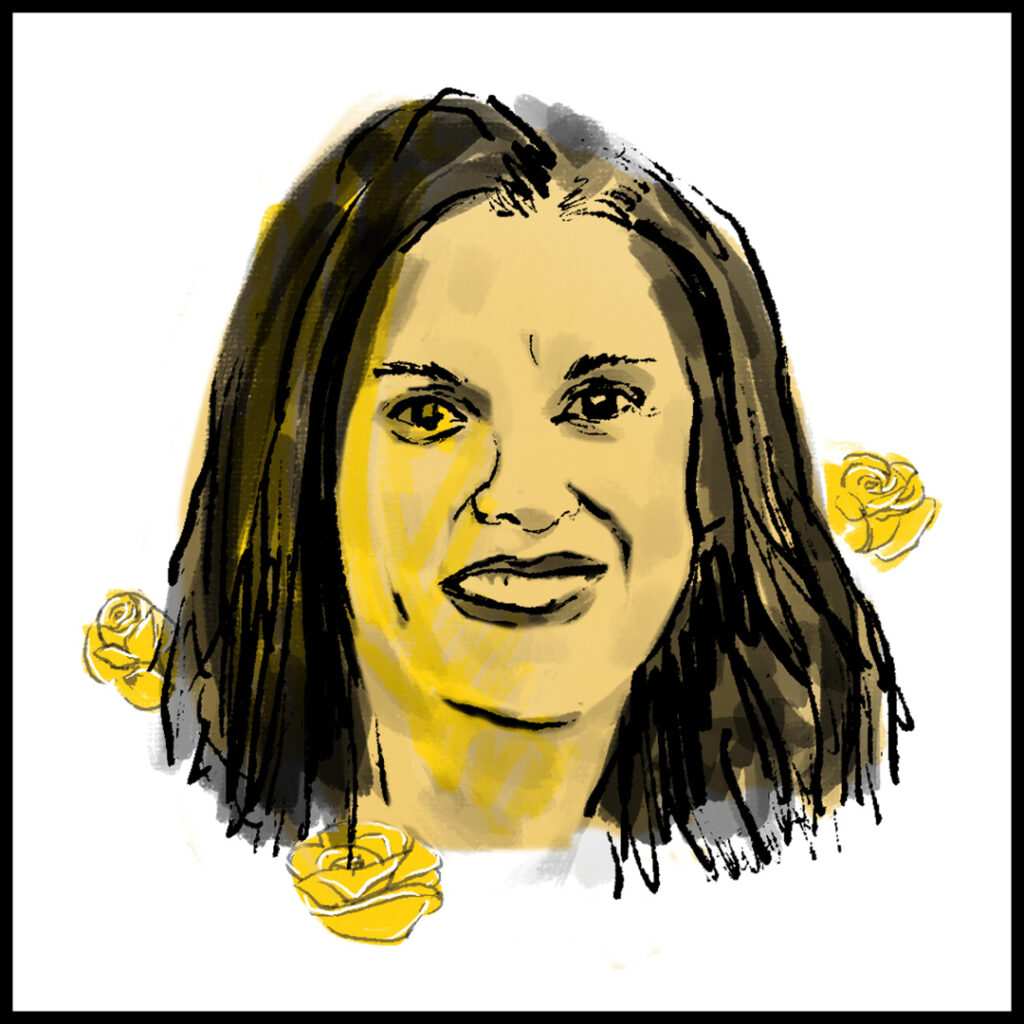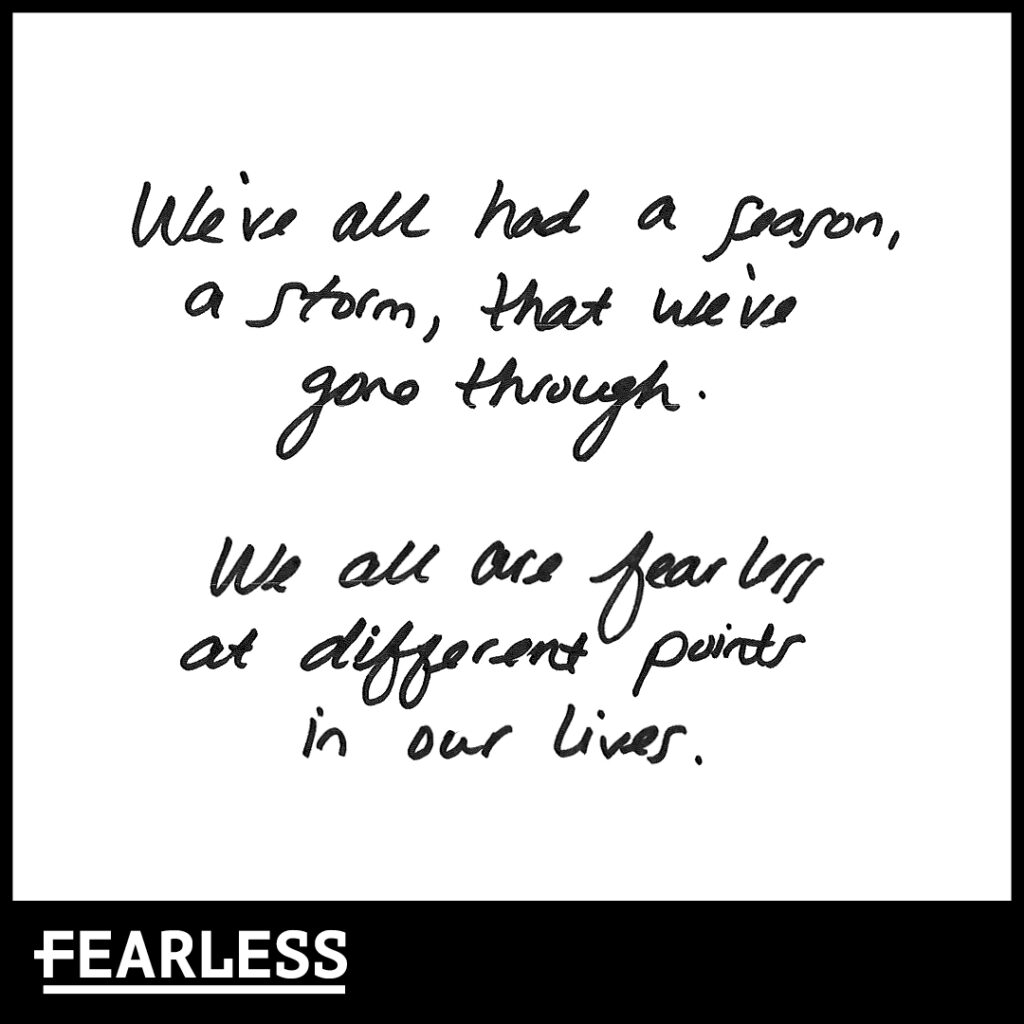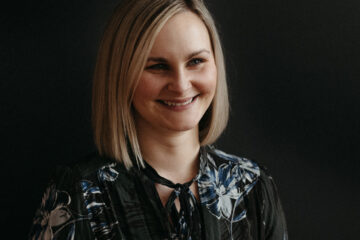As told to Emily Barske Wood

Tara Geddes grew up in a medical family. Her mom was an obstetrics nurse, and her dad an emergency medical technician. She knew early on that she also aspired to a career in health care – but she had zero desire to ascend to a leadership role.
She started her nursing career in 2001, first providing specialized care for surgical and oncology patients. Experience in the field would eventually change her perception of leadership.
Having built some management experience, in 2014, Geddes joined Floyd Valley Healthcare in Le Mars as community health manager, a public health position particularly important during the pandemic, before being named the chief nursing officer in 2021. In that role, she’s been instrumental in the hospital’s expansion of its birthing unit at a time when many are closing. As she’s risen through the ranks in her industry, she obtained education for the skills she felt she lacked – first a bachelor’s degree in business and then a master’s degree in healthcare administration.
Geddes and her husband, Scott, reside in Hinton and have five children, Delaney, Brooklyn, Addyson, Chloey and Easton. A terrifying medical experience in her own family has informed the kind of care she hopes to provide patients.
The following story has been formatted to be entirely in her words, and has been edited and condensed for clarity.
I have five children – four girls and one boy. No. 3 and 4 were twins. They were born in January 2010, nine weeks early, which we had experienced before when our other girls were also nine weeks early. They spent about six weeks in the neonatal intensive care unit. It was a really uneventful and typical NICU stay. But when we got home, one of them quit breathing for short periods of time.
We ended up finding out that she had sepsis, an infection in her blood. Then a couple of days later, her twin sister did the same thing, and she also had sepsis. She was admitted to the hospital and her course was drastically different from her sister’s – so much so that we were not sure she was going to make it.
She ended up turning the corner. We brought her home, but she started having seizures. We took her back to the hospital and she ended up having hydrocephalus, which is fluid on her brain. They transferred her down to Omaha, where we spent about six months in the intensive care unit.
Obviously, my initial fear and concern were for our daughter, who was critically sick. But then behind the scenes, you have all of these emotions and these worries that you’re working through: Am I going to lose my job because I need to be down here to take care of her? How are we going to pay our bills? Are the other three kids getting what they need? We had another infant back home, who couldn’t be down in Omaha for six months with her sister, so we tried to make sure that her care was being met and that she was meeting all those developmental milestones that children go through. Then you worry about your marriage – how do we navigate this together?
As women, we always feel like we have to take on everything. We have to be that super mom and a super-important employee. How do you balance all of those things? I think when life throws you those challenges, there isn’t always a balance with it. Sometimes your focus has to be on something different. But yet you still have these guilty feelings: I wasn’t the best employee, I wasn’t the best mom and I wasn’t the best friend. Trying to navigate that was the biggest challenge.


It’s different for every family but for my husband and me, getting through that time looked like the opportunity to sit down and say, “Here’s what we have. Here are our priorities and how we can divide and conquer.” I had to keep in mind that although his feelings may be different than my feelings, we both have the same goal in mind. We had to acknowledge that it’s going to be uncomfortable for a while. We’re not going to have the life that we typically had prior to her illness for a while. This is a season that we’re in. While I had the mom guilt or the woman guilt where I couldn’t be everything to everybody, he took the typical dad role and worried about how to make sure that he was providing. That wasn’t my priority at the time, but that was his. We had to recognize that we’re seeing the same thing in different ways, but we still wanted to be able to support each other and have faith in each other.
Being part of the medical community prior to that, but then going through it from a personal side, opened my eyes to how short life can be and how drastically it could change.
We had some experiences that I would never replicate on patients that I cared for. That really shaped who I was and how I talk to patients, how I approach them with empathy and compassion, and see that side of the experience to know what families are feeling. I’d been a nurse for over a decade by that point, but to see how some don’t have that bedside manner and the ability to look at things from the patient’s perspective, that really shaped me.
The care team found that severe meningitis is what caused our daughter’s hydrocephalus. She had some brain scans that were very concerning. She had surgery to put a shunt into her brain and the neurosurgeon had told us within 48 hours, she should be doing really well. I expected after 48 hours, she’s going to be back to what a typical newborn would be doing.
We hit the 48-hour mark, and then the 96-hour mark, and she really wasn’t getting better. She hadn’t had more seizures, but she had no muscle tone. She wasn’t responding the way that I would have expected a newborn to. She wasn’t eating still.
We had a resident who had come into the room and I said, “I’m really concerned because the neurosurgeon said that she should be turning the corner after 48 hours, and I just, I’m not seeing that.”
I was tearful and hadn’t had any sleep. He just looked at me and said, “Well, you do know she’s probably gonna have cerebral palsy, correct?”
I said, “What? That’s the first time we’ve ever heard that. I’m not sure what you’re talking about.”
He’s said, “Look, you can’t expect that, with the amount of brain damage that she had, that she’s going to be a typical baby.”
No one had ever even broached that subject with us at all. Even as a nurse, I hadn’t thought of that. You’re just kind of going off that adrenaline. I just completely lost it. He looked at me and kind of rolled his eyes and said, “I just don’t know what you really expected with this.”
Then he proceeded to leave the room. I was beside myself. I was by myself, two hours away from my family and my friends in my network. My husband was back home taking care of our kids.
I remember calling my mom, and I was really tearful, and I told her what he had said. The nurse that was caring for our daughter at the time had walked in while I was talking to my mom and I was crying. I said, “I didn’t expect that. This completely changes our entire family if she has severe cerebral palsy.”
I am a nurse. I knew there was a wide spectrum of cerebral palsy, but, of course, your brain goes to the worst-case scenario, and that completely changes everything. I started thinking: Can we live off one income? We’re going to have to, and I’m not going to be able to work. My career was very important to me, but my kids were most important. All of these thoughts go through your head.
My mom said, “It’s gonna be OK. We’ll work through it. You and your family will figure it out.”
We hung up the call and the nurse came back into the room. I’ll never forget her being very caring and compassionate. She sat down and said, “You have to remember when a specialist says to you that they’re going to turn the corner, they’re talking about their specialty. He was right – after 48 hours, she’s not having seizures anymore. The shunt is working. From a neurosurgery standpoint, she really has turned the corner.”
The nurse walked me off the ledge, and said, “You cannot give up hope on your child. Always hold faith. Just because her scan looks bad doesn’t mean that that’s what it’s going to be. It doesn’t mean that she’s going to have cerebral palsy. That’s something we’re not going to know for a long time.”
She apologized for the physician and said he shouldn’t have talked that way. She said, “Be patient. Walk the journey with your daughter. Either way, it’s gonna be OK. We’re going to work through this. We’ve got therapy. We’ve got everything lined up to help her get the best life that she possibly can.”
To have that person who didn’t know me at all come in and have that compassion, understand where I was coming from as a mom and walk through that journey with me, it meant the world because I didn’t have anybody else there with me.
There I was with one of our infants in Omaha, over two hours away from home, in intensive care. And we had three kids back home to take care of at the same time – trying to keep income coming in for your household, make sure you’re still getting to your older kids’ school functions and being able to support them with homework. As a health care provider, you just don’t know what families are going through personally. I think the care that we were getting in Omaha, they saw our daughter as that patient and took care of her, but they didn’t realize all the things that we had going on back home.
Here we are 14 years later, and my daughter does not have cerebral palsy at all. She is meeting all her milestones. She has a shunt, but you can’t physically see that. Academically, she’s great. I had felt this sense of hopelessness because of how the information was presented. There was a chance that she’d have cerebral palsy because the nurse had said “there’s a possibility, but you’re not going to know, so let’s just keep walking this journey.” To be able to give you realistic information and be able to have that compassion and empathy, it made a huge difference. It wasn’t like she said, “She’s going to be perfectly fine.” She didn’t say that. She gave me realistic information.
When it got to be too much, I made sure I was getting out walking, leaning on family and friends and being able to talk through it. I really used it as a learning opportunity. We had some medical providers through that situation that didn’t display empathy and compassion. I really looked at them and thought, “That’s not how I want to be as a medical professional. That’s not how I want to be as a nurse and a leader.”
On the flip side, we had such fabulous care from many providers. I was able to take that and ask myself, “How do I bring that back into what I do and make a difference in my community?”
Being down in Omaha, two hours away, was not convenient. We were so far away from family, and we didn’t have that network that we normally would have if we were close to home. Professionally, I think about how to make sure that we have the services close so people don’t have to travel that far. Obviously, there’s some specialty care, but if there are things that people don’t have to travel for, and don’t have to be so far away from their community network, it makes such a huge difference in what we do.
I think allowing ourselves the grace that we offer other people would be something that I would look back on and tell myself that I should have done differently. I think I held myself to this unreasonable standard of having to be everything to everybody.
We’ve all had a season, a storm, that we’ve gone through. We all are fearless at different points in our life. How do we get through those storms and come out on the other side a better person? By not letting it change who we are in a negative way, but defining us in a positive light and shaping who we are as individuals.

